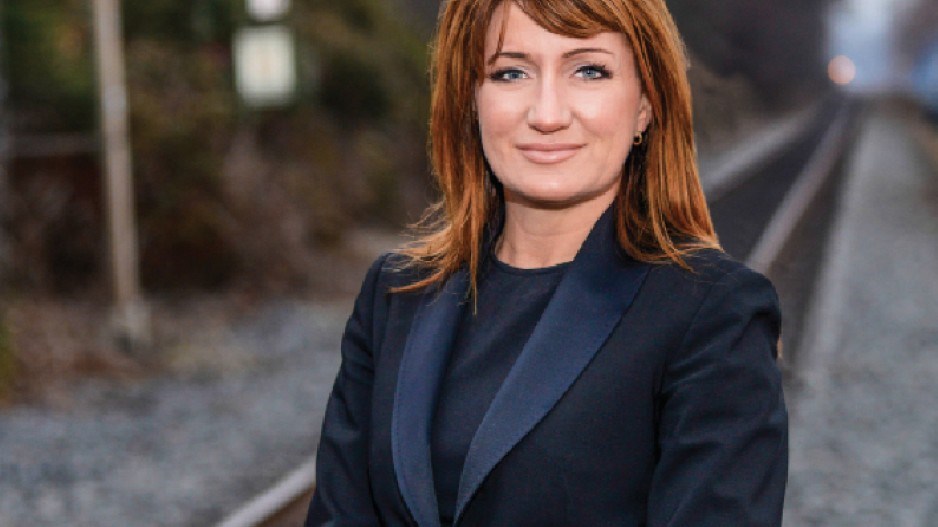T-Rail Products Inc. president Lisa Tuningley didn't start out being sold on sales.
"I thought sales was the worst job in the world. I always thought about that guy in WKRP in Cincinnati, Herb Tarlek, with the tacky suit and pressure sales tactics. But when you realize that sales is the fuel, it's the ignition for all transactions of business – you have to be able to sell something."
Tuningley, 41, is now trying to use her sales and marketing skills to apply a fresh spin on an old industry: rail.
"In our industry when we talk about ourselves, we talk about it like a honky, clonky engine," she said. "I don't want rail to be perceived as so traditional. We want it to be seen as that bullet train, not that steam engine."
Tuningley has put her nearly two decades of experience in the rail industry to work at her company, T-Rail Products, which she has grown in three short years to 12 employees and around $16 million in annual revenue. The company is headquartered in Surrey, and has offices in Vancouver, Winnipeg and Toronto.
Tuningley started working in her father's company, Nortrak, when she was a student.
The company was in the decidedly unsexy business of manufacturing rail track. It wasn't exactly the exciting career she imagined for herself when she enrolled in a marketing and professional sales program at the British Columbia Institute of Technology.
"It was my dad's company. That was what he did.
"I was more creative; I wanted to get into making advertisements and commercials."
But it was shortly after working at Nortrak during a co-op work term that she realized rail might have more to offer.
"It was something real; there's so much dimension in our industry. You can learn marketing, you can learn steel, you can learn about all these different industries: grain, oil, potash, mining, all the industries affiliated with rail," she said.
"You can talk about logistics, you can talk about raw materials, you can talk about freight supply train solutions."
The company was looking to hire someone in sales, and she was shopping the job around to her classmates. As she talked up the position, the company and the industry, she realized she wanted the job for herself.
"I … realized why would I not want to do this, just because it's my dad's company?"
She was hired for the job, but her father urged her to work there for just two years.
"He was really about pursuing your own dream."
However, the two years turned into 18, during which her father sold Nortrak to an Austrian company, and it became known as voestalpine Nortrak Inc.
Tuningley accepted a buyout in 2010 after the company's focus changed away from manufacturing track. She started her own business the same year.
"I always wanted to do the trading, and it never fit in the business. It just was a different mould."
The buyout pushed her to start her company, which, as a single mother of a teenaged son, she would likely never have done otherwise.
In the ecosystem of the North American rail industry, T-Rail is a small fish in a big pond. But the company has succeeded by working in a space that rail heavyweights like Canadian Pacific Railway (TSX:CP), Canadian National Railway (TSX:CNR) and Burlington Northern Santa Fe (NYSE:BNI) don't devote any resources to.
"In the beginning, we just told people that we are a supplier of new and renewable materials," Tuningley said. "We just wanted to be, 'ABC, 123, this is what we do, call us if you need materials.'"
The fledgling business slowly built up a client base of companies that needed help building and maintaining track. For instance, a mining company that needs to get potash or coal to market must build track to reach the main line operated by one of the major railroad companies.
It's in assisting these clients, whose business is not rail, that T-Rail has found its niche.
"They want to do the right thing; they just don't know what to do," Tuningley said. "So that's where we step in, and we supply logistic solutions, material spec solutions, because at the end of the day safety is the most important thing in rail."
Her company has also been able to deliver materials to these clients more quickly than conventional suppliers.
Tuningley declined to reveal how T-Rail has gained this competitive edge.
"All I can say is we try."
She said that quicker turnaround is important to T-Rail's clients, who often don't realize a four- to six-month wait is normal for track material.
"We can't have solutions that work for CN or CP, because they know the business really well. They know to order in advance and then schedule and maintain and do these things.
"Our innovation is to create solutions that don't ask [our clients] to change."
Those track extensions will only grow in the future, along with the rest of the rail system. Currently, 70% of surface goods that are hauled in Canada are transported by rail. Between 2011 and 2040, total U.S. freight shipments will increase by 62%.
That explosive growth will require rail to innovate, Tuningley said. That means looking to other industries for ideas, which is not how rail has traditionally operated.
"If rail's supposed to grow so fast, what are those ideas? They might exist in a telephone communications company. It might exist in a trucking company, it might be somebody making shoes," she said.
"We want to grow rail to be something that it isn't today, and that's so we can keep up with its growth and manage it."




